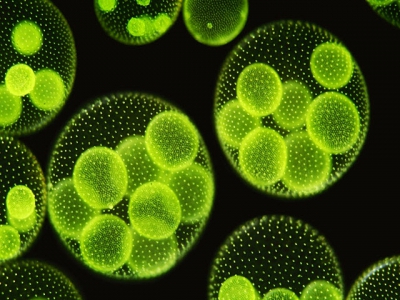Salmon farmers sign up for algal alternative to fish oil

A coalition of Norwegian fish farmers has formed a new partnership which will ensure that their feeds contain an algal ingredient that will help them improve the sustainability of their salmon production.
Salmon Group, the world's largest network of local, family-owned fish farming and aquaculture companies have entered the feed partnership with algal product pioneer Corbion and feed producer BioMar. Salmon Group represents 44 Norwegian fish farmers and 12 percent of all fish feed sold to salmon and trout farms in Norway.
Salmon Group has a goal of reducing the overall environmental footprint of feed while maintaining feed quality, feed performance and fish welfare. BioMar responded by developing a bespoke feed that maintains high omega-3 levels (EPA + DHA) in the feed, reduces the carbon footprint, and significantly reduces the fish-in, fish-out ratio and contamination of pollutants. BioMar achieved this by formulating with a variety of alternative ingredients, including Corbion’s AlgaPrime DHA, the sustainably produced, algae-based source of long-chain omega-3s. The first farmed salmon fed on the new recipe are expected to reach the market by the end of 2019.
"Salmon Group has been working systematically for several years to ensure more sustainable farming practices, and feed is a key element here," said Anne-Kristine Øen, CEO of Salmon Group. "Through BioMar's innovation efforts, they have identified and sourced alternative ingredients, like AlgaPrime DHA, that help put our sustainability goals into practice, and meet retail and consumer demand for more responsibly raised seafood."
"The leadership shown by Salmon Group is impressive and we are thrilled to play a part in improving sustainable aquaculture across the globe," said Marc Den Hartog, executive vice president of innovation platforms at Corbion. "AlgaPrime DHA continues to be adopted and trusted by salmon farmers, as they look to improve the omega-3 content and sustainability profile of their salmon."
The continued expansion of BioMar feed with AlgaPrime DHA is the latest in a series of milestones that shows demand for algae-fed salmon among farmers, brands and retailers. To date, BioMar had sold at least 500,000 tonnes of feed containing AlgaPrime over the past three years.
"As demand for sustainable food options is hitting a critical mass, key industry players in food service and retail are increasingly relying on their supply chains to improve their environmental impact," said Vidar Gunderson, global sustainability director at BioMar. "The use of alternative feed ingredients, such as algae-based omega-3s, is an important part of the effort to address sustainability issues within the salmon industry and beyond."
Since 2016, Corbion has been producing AlgaPrime DHA at large industrial scale relevant to the needs of the aquaculture industry. Developed to reduce dependency on marine fisheries and provide a new source of long-chain omega-3s for the aquaculture industry, it is a native, whole algae ingredient that contains approximately three times more DHA than fish oil. AlgaPrime DHA is produced through fermentation with non-GM cane sugar as a feedstock and a production system powered by renewable energy.
Related news
 Preventing and controlling salmon lice in commercial aquaculture
Preventing and controlling salmon lice in commercial aquaculture A cohort study of commercial salmon farms in Norway explores different prevention and treatment strategies for salmon lice and finds that habituated cleaner
 Research reveals new ways to raise EPA and DHA levels in both salmon and humans
Research reveals new ways to raise EPA and DHA levels in both salmon and humans Diets containing a mixture of plant oil and fish oil can stimulate both salmon and humans to produce their own long chain omega-3 fats
 Wild salmon pathogens discovered that could pose a threat to aquaculture
Wild salmon pathogens discovered that could pose a threat to aquaculture Three new viruses – including one type that has never previously infected fish – have been identified in populations of both wild and farmed salmon